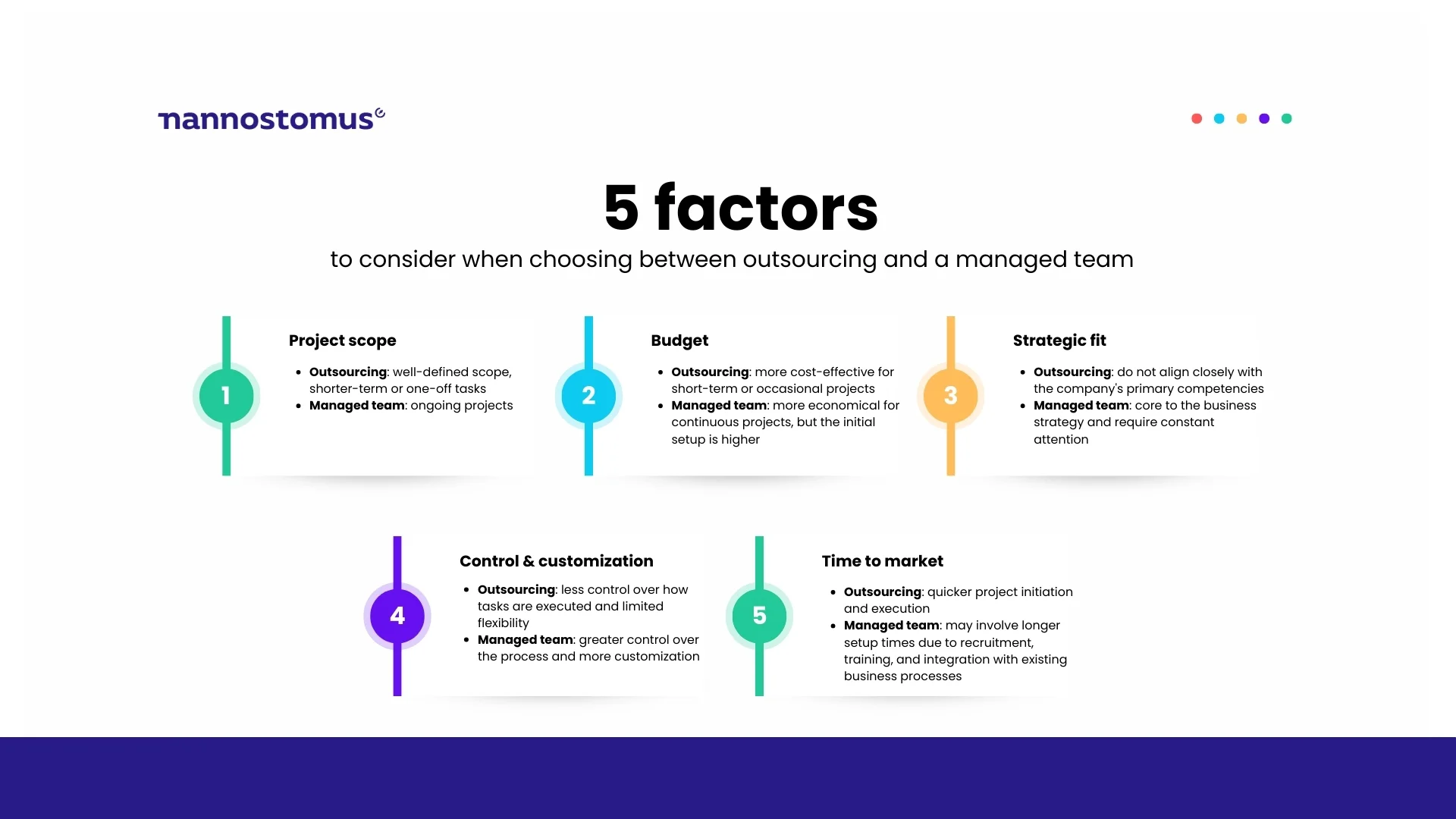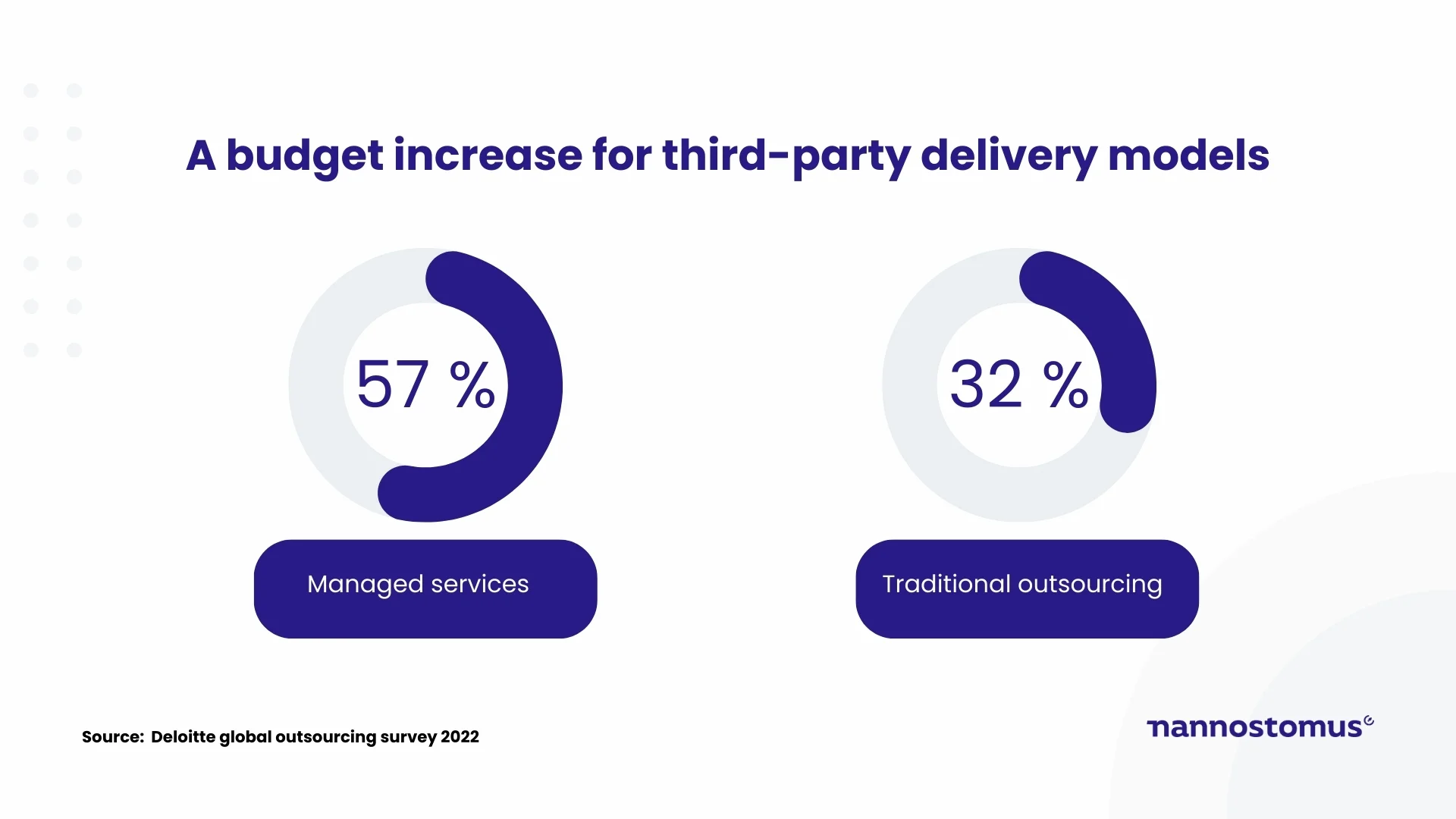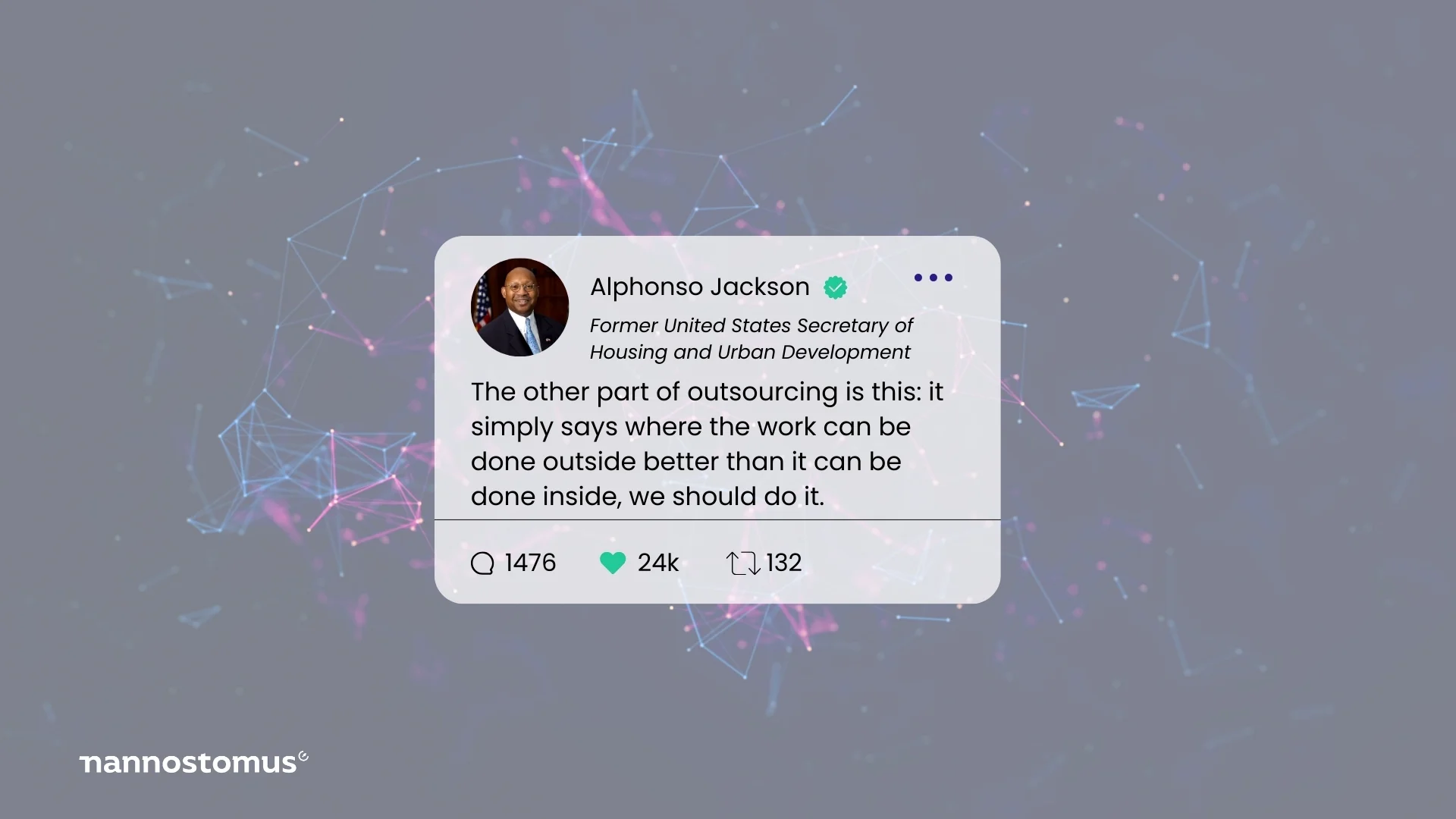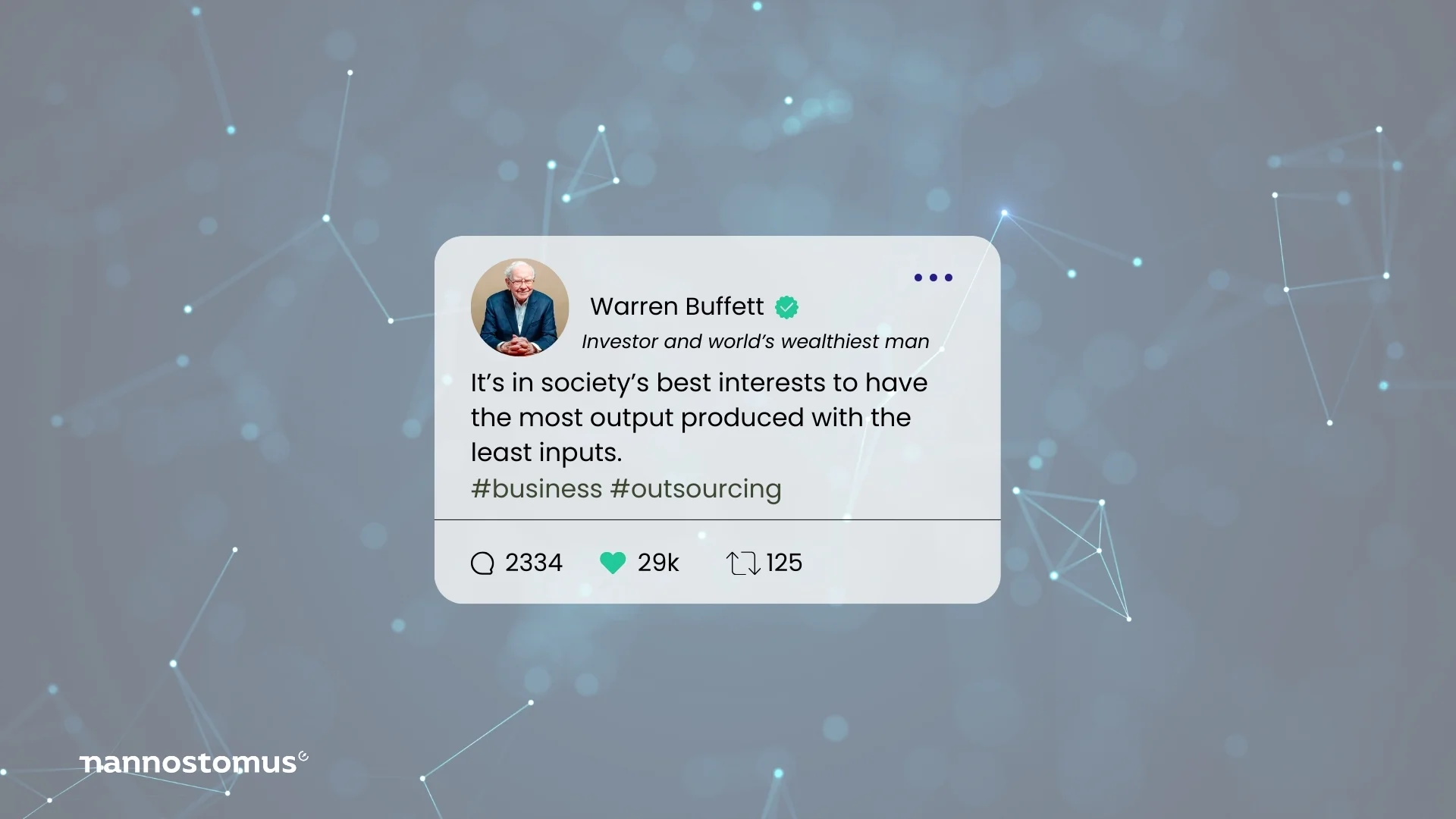What’s common among Google, Microsoft, Apple, Cisco, Deloitte, and Amazon? They all embrace third-party delivery models: outsourcing or managed services. And the results are pretty clear. This strategic decision enabled them to focus on their core competencies. While outsourcing specialized tasks to experts.
Though, this approach isn’t reserved for the big players only. In fact, over 21% of small businesses planned to hire an outsourcing provider in 2022, as per Clutch’s findings. Generally speaking, 65% of businesses outsource their information technology needs, including data extraction services.
But as you decide to take this path for automated data collection, you may face a dilemma: which model should you choose? Traditional outsourcing or managed services? At Nannostomus, we’re here to help you navigate these options. So, let’s figure out which aligns best with your business objectives.
What is web scraping outsourcing?
Web scraping outsourcing is the most traditional and least hands-on approach to handling the complex task of extracting data from the web.
In this case, you tell the service provider your requirements, and they deliver ready-to-use data (or raw data if you request this) by a specific deadline. And the best part of it—you don’t have to worry about the nitty-gritty of the process. Your involvement is mainly at the beginning—setting the course. And at the end, when you receive the final dataset.
When it comes to web scraping outsourcing, you’ve got options:
- Onshore outsourcing. This is when you partner with a local company or freelancer. Ease of communication and cultural alignment is the best part of it. You’re on the same page, both literally and figuratively.
- Nearshore outsourcing. Here, you’re looking at companies or freelancers in neighboring countries, often within the same time zone. It offers the possibility for more competitive pricing than onshore outsourcing.
- Offshore outsourcing. This option takes you across the globe to a company or freelancer in a different time zone. It’s often the most cost-effective choice and offers access to a wider pool of talent.
In all these models, you often have a designated point of contact. Like a project manager who communicates on behalf of the outsourced web scraping team. This person serves as your go-to for all project-related information. Communication is structured and occurs at predefined intervals or project milestones. While structured, there’s usually scope for ad-hoc discussions if urgent issues or questions arise. However, these are generally the exception rather than the norm.
What is a managed data extraction team?
A managed team allows you to leverage the expertise and independence of an outsourced team, while sharing the risk and responsibility for delivering quality results.
Within this setup, the team operates independently from your in-house team. Yet remains in sync with your goals and strategies. Here, the outsourced project manager reports to the in-house product owner as frequently as needed.
Communication in a managed team model often mirrors your internal communication processes. Usually, you’ll use shared communication platforms (Slack, Microsoft Teams, or anything else that integrates with your in-house tools). There are daily or weekly stand-ups or check-ins for updates and collaborative problem-solving. Though, you may have direct access to individual team members—not just a project manager.
The greatest part of this approach is adaptability. Teams are formed based on the specific functional areas of your web scraping project. For example, you may have a Scrum master to ensure the project stays on track. Or a cloud architect to set up and maintain cloud components. Just whoever your project requires.
What’s the difference between outsourcing vs managed service?
Both outsourcing and managed services share key similarities:
- External expertise. In both models, you’re accessing specialized skills and knowledge that may not be present in your in-house team.
- Resource efficiency. Both approaches allow your business to save on resources that would otherwise be spent on recruiting, training, and maintaining an in-house web scraping team.
- Scalability and flexibility. Both models allow your business to adjust the level of service based on current needs and demands.
- Contractual agreement. Both services are governed by a contractual agreement, which outlines the scope, terms, and conditions of the service provided.
But outsourcing and web scraping managed services differ in their level of integration, control, nature of the relationship, and other things. For instance, outsourcing is more about a hands-off approach. While managed services involve a more integrated, ongoing partnership that adapts and evolves with your business’s needs. Check out the chart below to see the difference in more detail.
| Aspect | Outsourcing | Managed team |
|---|---|---|
| Service scope | Often project-specific or task-specific, with a focus on particular operations or functions. | Typically provide comprehensive, ongoing management and support for an entire function or department. |
| Relationship dynamics | More transactional with a focus on specific deliverables. | More partnership-oriented, focusing on long-term relationships and collaborative development. |
| Control & management | Less control over the process and management; the focus is more on output. | More strategic control and oversight. |
| Engagement model | Short-term or project-based, and the relationship ends upon project completion, unless a new project is initiated. | Generally long-term with a focus on ongoing support or scaling. |
| Flexibility | Tends to be less flexible; services are often predefined or packaged. | More tailored to the client's needs and may evolve as the client’s requirements change. |
| Payment structure | Often based on a per-project or per-task basis. | Typically involves a fixed fee or a recurring subscription model. |
| Integration with internal processes | Less integrated with internal business processes. | Usually highly integrated and aligned with business strategies and processes. |
Need a hands-off approach to data extraction?
Consider our managed scraping services.
How to choose the right option for your project: full-service data extraction outsourcing or a managed team?
To better understand which option fits your business best, let’s analyze two common scenarios:
- Scenario 1: Your company is launching a one-time real estate market analysis project. You need to quickly gather current listings of available properties, historical and current market prices, and information on neighborhood amenities, schools, crime rates, and public transport availability from various online sources. You expect this data to be delivered to you in CSV.
- Scenario 2: You’re growing a business that helps companies and HR agents make smarter decisions about whom they’re hiring. You equip organizations with accurate information about offenders across the USA. You need a continuous stream of data to keep the database always up-to-date.
For the first scenario, we would recommend going with the outsourced data mining approach. And for the second—hire a managed team. Why exactly? Let’s break down the key aspects that make one model more advantageous than the other in each particular case.

Project scope
In the first scenario, the one-time project has a clear and defined scope:
- Specific data collection. Since we, as a web scraping company and your service provider, know what data you want and from what sources, we can estimate what skills and tools we’ll need to engage to satisfy your requirements.
- Time-bound and focused. The project is a one-time initiative. This means the work is highly focused and time-bound—we know our scope of responsibilities and have a specific deadline for data delivery.
- No need for ongoing adjustments. The project has a start and end point, with a clear set of deliverables defined from the outset. So, there’s no need for continuous adjustments or parser fixes.
Conversely, the second scenario demands a managed team approach. This project requires continuous data updates. So, it’s more complex as we should adjust parsers to new requirements or changes in data sources.
- Ongoing data updates. The core requirement here is the continual updating of a database with offender information across the USA. So, we’ve got to ensure regular web scraping to capture any new entries or updates in records.
- Integration with client’s systems. This is not a must, but happens frequently with the managed team model. Here, you’ve got to work closely with a remote web scraping team so that they can align deliverables with your data formats, usage, and application needs.
- Long-term relationships. Given the continuous nature of the project, you build a long-term relationship. The external team becomes an integral part of your business processes and works collaboratively to meet these needs.
Budget
If you have a short-term project, outsourcing proves to be more budget-friendly. First, it avoids the long-term financial commitments associated with hiring and maintaining a full-time team. Second, these projects usually have a limited scope and duration. You’ll get a rough quote that counts all those known details of your project. Thus, potential unexpected costs are minimal.
In the case of managed services, establishing a team might involve more upfront costs. It may take more time (and, thus, investment) to set up communication channels, align processes, and understand the business context. But because of the ongoing nature of the project, this cost is usually justified. So, over time, a managed team proves more economical. As the team becomes more efficient and aligned with the project goals, the cost per unit of work tends to decrease.
To get a better idea of how to estimate the web scraping cost, jump into this article.
Strategic fit
Let’s get back to the first scenario where you want to do market research for your real estate business. Is this research important? Absolutely! As it will enable you to understand what the customers need, what your competitors offer, and how you can win your place under the sun. But is market analysis the core competence of your business? No. What you do is help people buy, sell, and rent homes. As you outsource web scraping services, you meet the immediate need for data. And that’s it.
And now to the second case, where you provide up-to-date offender data to your clients. No doubt, automatically pulling data from websites is strategically important both for your business and your customers. An ongoing flow of accurate and organized data is at the core of the service you provide. So, this aspect of your business will require constant maintenance, which you can handle to a managed team. They will:
- Load data from different sources
- Validate and standardize new data
- Fix parsers to fetch data from updated websites
Control and customization
In the outsourcing model, control and customization are typically more constrained compared to a managed team approach. Here’s how it works:
- You usually provide a detailed specification of what needs to be done at the start of the project. The external team then follows these guidelines to deliver the end product—i.e. data. So, once the project is underway, you get less flexibility for changes.
- The way tasks are executed is largely in the hands of the outsourcing partner. They apply their methods and processes to complete the project. And it may not always align perfectly with your preferred ways of working.
Need more control? Then consider managed data extraction services.
- In this setup, there’s a continuous collaboration between your in-house team and the managed team.
- With a managed team, you have greater control over how the project integrates with your existing business processes. The team will tailor their methods to align closely with your operational standards.
Time to market
In an outsourcing model, you can typically start projects more quickly. This is because outsourcing partners already have the necessary team and resources in place. They’re ready to jump into action once the project scope and specifications are defined. There’s also no need for recruiting and training that you would have with a self-managed team.
Setting up a managed team might result in a longer setup, but more tailored execution. Mainly, because of the need to hire the right personnel to match the project needs. And, of course, integrate those people into your existing flows. This initial investment in time pays off in the long run with a team that operates seamlessly as part of the business. But it does mean a slower start compared to outsourcing.
Why do companies choose third-party delivery models for web scraping?
The Deloitte global outsourcing survey indicates a strong growth in the use of third-party services over the last few years.
 Let’s look at what pushes decision-makers to select third-party delivery models for data harvesting.
Let’s look at what pushes decision-makers to select third-party delivery models for data harvesting.
The hunt for specialists
The same Deloitte report revealed that one in two executives consider finding suitable specialists as their biggest internal obstacle in executing corporate strategies. And when it comes to covering the talent gap for automated data scraping, this challenge only amplifies. Why exactly? Because this field requires a unique blend of skills—from understanding complex data structures to navigating the ethical considerations of data collection. And that’s not what just any developer can cover.
Cost: a major consideration
According to Zippia, 59% of businesses pinpoint cost reduction as their top reason for outsourcing. In the context of web scraping, this makes perfect sense. Developing an in-house team for this specific task involves significant expenses. Outsourcing, on the other hand, significantly reduces these overheads.
Outsource web scraping companies often work with multiple clients. This allows them to leverage economies of scale. In other words, they spread out the cost of technology, tools, and expert manpower over several projects. For your business, this means access to high-quality services at a fraction of the cost of building and maintaining an equivalent in-house team. And why invest more if you can actually spend less and get the same awesome results?

Efficiency: a key to success
When 24% of small businesses turn to outsourcing to increase efficiency, they’re acknowledging a fundamental truth: time and resources are limited. In-house web scraping demands both, often in large quantities. It requires training staff, troubleshooting data issues, and updating systems.
Outsourcing, on the other hand, frees up these resources. It enables businesses to focus on their core activities while an external team handles the complex and time-consuming task of web scraping.

Accelerating decision-making
26% of executives lack adequate data to support informed decision-making. And it’s not always about the internal data about the company’s performance. Frequently, there’s a need for insights into the market, competitors, and customer preferences. But here’s the catch: extracting and processing this data isn’t simple. It demands specific skills and advanced tools. This is where you may want to resort to automated data collection outsourcing.
Outsourced web scraping helps you keep your finger on the pulse of the market. You’ll understand what’s trending, what your customers are talking about, and what’s on the horizon. And, most importantly, you’ll keep your in-house team focused on other important things.
Conclusion
The choice between outsourcing and a managed team for web scraping is guided by the project’s scope, duration, strategic importance, need for control and customization, budget considerations, and desired speed to market. Let’s recap how each of these dedicated outsourced scraping team models works in different scenarios.
Outsourcing is your go-to for short-term, well-defined projects, while a managed team is the answer for strategic, ongoing initiatives requiring close integration with your business.
At Nannostomus, we offer both outsourcing web scraping services and providing a fully self-managed team. Contact us to explore the most suitable cooperation model for your specific requirements.




